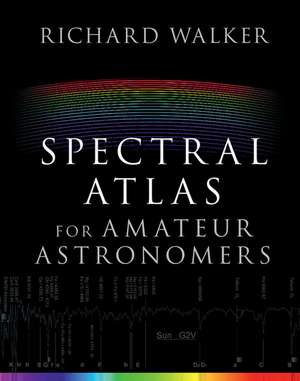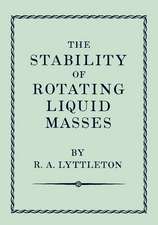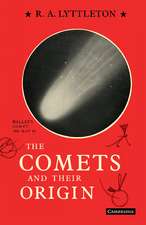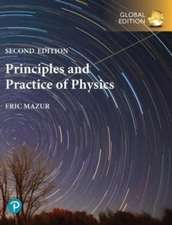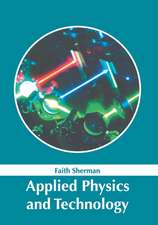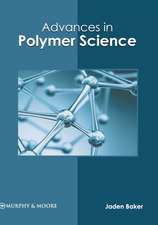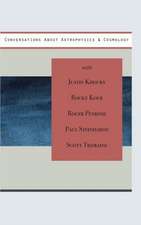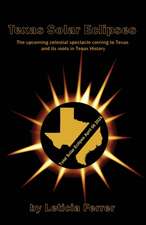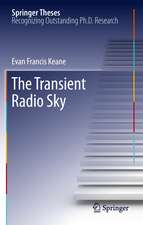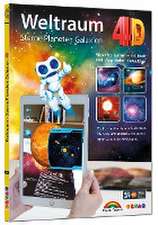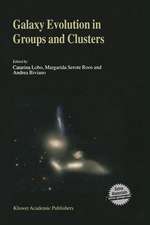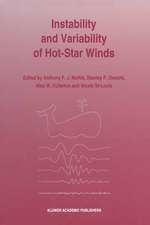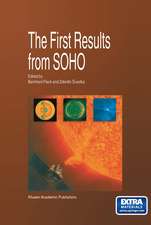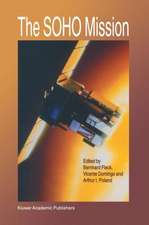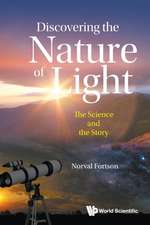Spectral Atlas for Amateur Astronomers: A Guide to the Spectra of Astronomical Objects and Terrestrial Light Sources
Autor Richard Walkeren Limba Engleză Hardback – 19 iul 2017
Preț: 600.84 lei
Preț vechi: 675.10 lei
-11% Nou
114.98€ • 119.36$ • 95.88£
Carte tipărită la comandă
Livrare economică 24 martie-07 aprilie
Livrare express 14-20 februarie pentru 139.59 lei
Specificații
ISBN-10: 1107165903
Pagini: 290
Ilustrații: 211 colour illus. 26 tables
Dimensiuni: 222 x 288 x 16 mm
Greutate: 1.01 kg
Editura: Cambridge University Press
Colecția Cambridge University Press
Locul publicării:New York, United States
Cuprins
Preface; Acknowledgements; 1. Directory of plates; 2. Selection, processing and presentation of the spectra; 3. Terms, definitions and abbreviations; 4. Overview and characteristics of stellar spectral classes; 5. Spectral class O; 6. Spectral class B; 7. Spectral class A; 8. Spectral class F; 9. Spectral class G; 10. Spectral class K; 11. Spectral class M; 12. Spectral sequence on the AGB; 13. M(e) stars on the AGB; 14. Spectral class S on the AGB; 15. Carbon stars on the AGB; 16. Post AGB stars and white dwarf; 17. Wolf Rayet stars; 18. LBV stars; 19. Be stars; 20. Be shell stars; 21. PMS protostars; 22. Peculiar CP-stars; 23. Spectroscopic binaries; 24. Novae; 25. Supernovae; 26. Extragalactic objects; 27. Star clusters; 28. Emission nebulae; 29. Reflectance spectra of Solar System bodies; 30. Telluric molecular absorption; 31. The night sky spectrum; 32. The night sky spectrum; 33. Terrestrial and calibration light sources.
Recenzii
'Trypsteen and Walker's Spectroscopy for Amateur Astronomers does a thorough job of explaining the science of spectroscopy and should help interested amateurs with equipment choices and processing; the Spectral Atlas for Amateur Astronomers gives them everything else they'll need, namely, a variety of documents and sample spectra for popular targets. It brings together the spectra for the main stellar classes, as well as spectra from stars at various stages of development (from protostars all the way through the stellar life cycle to their transformation into planetary nebulae, supernovae, or white dwarfs). The atlas also includes documents and spectra for star clusters, extragalactic objects, and emission nebulae. Pair this book with Marc F. M. Trypsteen and Richard Walker's Spectroscopy for Amateur Astronomers and you'll have a comprehensive package on spectroscopy.' S. N. Johnson-Roehr, Sky & Telescope: The Essential Guide to Astronomy
Descriere
Featuring detailed commented spectral profiles of more than one hundred astronomical objects, in colour, this spectral guide documents most of the important and spectroscopically observable objects accessible using typical amateur equipment. It allows you to read and interpret the recorded spectra of the main stellar classes, as well as most of the steps from protostars through to the final stages of stellar evolution as planetary nebulae, white dwarfs or the different types of supernovae. It also presents integrated spectra of stellar clusters, galaxies and quasars, and the reference spectra of some terrestrial light sources, for calibration purposes. Whether used as the principal reference for comparing with your recorded spectra or for inspiring independent observing projects, this atlas provides a breathtaking view into our Universe's past. The atlas is accompanied and supplemented by Spectroscopy for Amateur Astronomers, which explains in detail the methods for recording, processing, analysing and interpreting your spectra.
